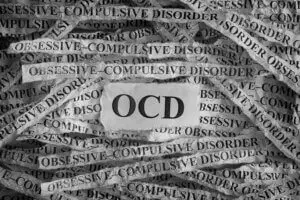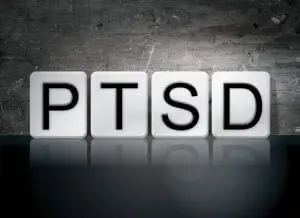Living with Post-Traumatic Stress Disorder: Finding Hope in the Darkness
April 27, 2023

A lot of the awareness of post-traumatic stress disorder (PTSD) has been linked with soldiers and veterans. As a result, many people associate PTSD only with combat experiences and trauma. However, anyone who has lived through or witnessed any type of traumatic event that leaves the individual with feelings of fear, terror, or helplessness can develop PTSD.
Trauma experiences such as combat, car accidents, natural disasters, abuse, physical or sexual assault, mass violence, and secondhand trauma like that experienced by first responders and recovery workers can all lead to PTSD.
The National Center for PTSD reports the following:
- About 6 out of every 100 people (or 6 percent of the US population) will have PTSD at some point in their lives.
- About 12 million adults in the US have PTSD during a given year.
- About 8 out of every 100 women (or 8 percent) in the US develop PTSD sometime in their lives compared with about 4 in 100 men (or 4 percent) in the US.
- The risk of developing PTSD is increased for individuals who are directly exposed to trauma or who are injured by the traumatic event.
Did People in the Bible Experience PTSD?
The Bible does not tell us specifically that anyone experienced PTSD. However, when one looks at the experiences many people in the Bible faced, it is possible they may have experienced PTSD.
For example, Joseph was placed in a pit and sold as a slave by his brothers, taken to a country where he did not know the language or the culture, and later placed in jail for a crime he had not committed.
King Saul, as the commander and king of Israel, experienced the reality of war and combat while he led his army to fight Israel’s enemies.
King David spent years running from Saul, who wanted to kill him.
Jonah was thrown overboard, swallowed by a big fish, and then spent three days in its belly before God caused the fish to vomit Jonah onto the shore.
The nation of Israel was placed in captivity and experienced violence, assassinations, and cruelty — not just once but multiple times at the hands of the Babylonians, the Persians, the Greeks, the Maccabees, and the Romans.
As Jesus went through His trial and Crucifixion, He experienced the trauma of being betrayed, tortured, and killed. The apostles were imprisoned, beaten, and martyred.
All these experiences certainly would rise to the level of trauma that could result in PTSD. Accordingly, trauma and its effects are not new concepts.
Symptoms of PTSD
The American Psychological Association states PTSD is characterized by the following symptoms:
- Reexperiencing the trauma in painful recollections, flashbacks, or recurrent dreams or nightmares
- Avoiding activities or places that recall the traumatic event
- Emotional numbing with disinterest in significant activities and feelings of detachment from others
- Exaggerated startle response, disturbed sleep, and difficulty concentrating or remembering
- Feeling guilty about surviving the trauma when others did not
Finding Hope in the Darkness of PTSD
Regardless of the precipitating trauma, individuals who experience PTSD can feel trapped in the darkness as they relive the memories of the event. So how do these individuals find the hope they need to escape this darkness?
Most people who experience PTSD will require professional help from a counselor. Cognitive behavioral therapy (CBT) and eye movement desensitization and reprocessing (EMDR) therapy have been found helpful in treating PTSD symptoms. Additionally, there are medications that can help with symptoms. If someone needs assistance to find a qualified counselor, the American Association of Christian Counselors can provide this information.
Beyond medication and professional therapies, Christians should also remember the power in abiding in Christ.
When Joseph eventually came face-to-face with the very brothers who had instigated his traumatic experience, his response served to reframe his experience and set his heart on God. He said, “You planned evil against me; God planned it for good to bring about the present result — the survival of many people” (Gen. 50:20 HCSB). These words remind us God never overlooks the hurtful experiences we endure.
Psalm 121:2 reminds us our help comes from the Lord. Not only do we know the Lord helps us when we experience trauma, but we also know He intimately understands because He, too, faced the trauma of the Cross. In fact, as the omnipotent maker of heaven and earth, He knows and relates to everything you experience.
Although a traumatic event may leave scars, those scars can tell a story. In John 20:24–29, Jesus had risen from the dead and was showing his wounds to Thomas. Just as they did for that doubting disciple, those scars still tell the story of Christ’s unfailing love for us, of the trauma He endured on our behalf.
Your scars can tell a story, too, a story of experiencing and surviving extremely difficult circumstances and then, with God’s help, healing and living with purpose and power.
Finally, memorizing passages from the Word of God to recall in the times when PTSD overwhelms you can help you find peace and light in the darkness.
Here are a few verses to get you started:
- Psalm 34:4
- Psalm 34:18–19
- Psalm 91:4–6
- Psalm 107:13–16
- Psalm 121:2
- Isaiah 41:10
- Romans 8:15–16
- 2 Corinthians 12:9
- 2 Timothy 1:7
Julia M. Bruce holds a master’s degree in professional counseling and serves as the executive director of foster care at One More Child. In this role, Julia and her staff recruit, license, and train qualified Christian families to serve as foster parents. Many children in the foster care system have experienced trauma, and One More Child and the families work to help them find the hope and healing they need to thrive in spite of their life experiences. Julia is also the author of God, Love, and Marshmallow Wars and is a blog writer and podcaster.
“How Common Is PTSD in Adults?” PTSD: National Center for PTSD. US Department of Veterans Affairs. Accessed January 12, 2023. https://www.ptsd.va.gov/understand/common/common_adults.asp#:~:text=About%206%20out%20of%20every,have%20gone%20through%20a%20trauma.
“Posttraumatic stress disorder (PTSD).” APA Dictionary of Psychology. American Psychological Association. Accessed January 12, 2023. https://dictionary.apa.org/posttraumatic-stress-disorder?_ga=2.241183746.104654250.1667510618-1507140386.1667510618.
Disclaimer: The information shared on this page is not meant to diagnose or treat a mental health condition. We encourage you to follow up with your health-care provider and seek a mental health professional for individual consultation and care.























